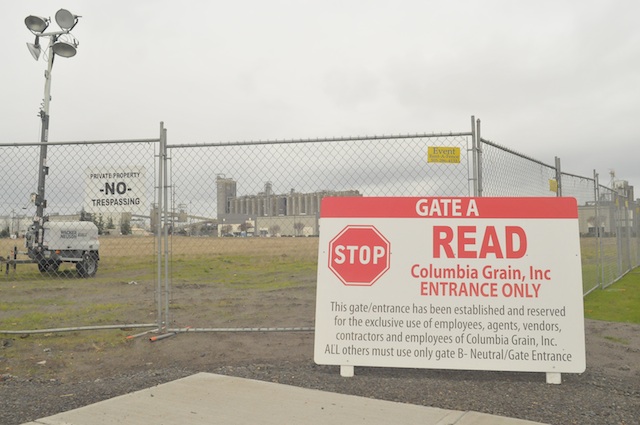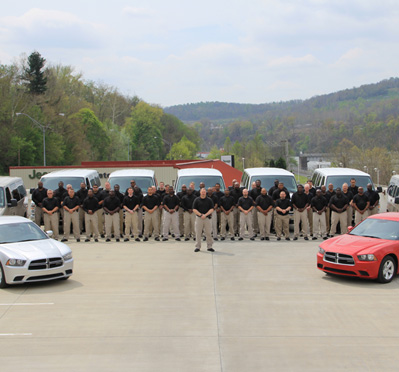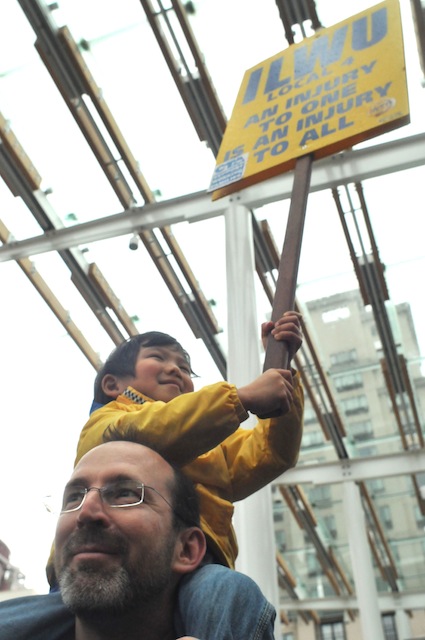
Fencing and warning signs have been put up around the publicly owned Port of Portland Terminal 5 in preparation for a possible labor conflict.
Story and photos by Pete Shaw
The contract being offered to the International Longshore and Warehouse Union (ILWU) by the Pacific Northwest Grain Handlers Association (PNGHA) has little effect on wages, but seeks vast changes to workplace rules, particularly those dealing with hiring and safety. Though the contract signing deadline of November 28 has been pushed back, the reality of a strike or lockout lingers heavily.
The foundation for the PNGHA’s current offer was laid by the struggle in Longview earlier this year when the EGT demanded deep concessions, which the ILWU accepted. The PNGHA – composed of Cargill, Columbia Grain, Louis Dreyfus, and United Grain – is predictably claiming that the concessions of the Longview contract have created an uneven playing field and so, it claims, Portland, Seattle, Tacoma, and Vancouver must be brought in line.
A copy of this “last, best, and final offer,” was obtained by the Oregonian, which recently described the new contract as taking away many “perks” of the job, and not surprisingly chose examples that seem flagrant, even anachronistic, to anyone unfamiliar with the work and history of the ports. But beyond these cherrypickings are concessions that should be understandable to anyone.
For example, the contract states that any three work stoppages by grain workers for health and safety concerns voids the contract. Protections from work speed ups are removed, meaning the likelihood of mistakes will rise – particularly those that can result in injury or death. The contract also allows grain companies to hire non-union workers, with the union being required to make them ILWU members within 30 days. The PNGHA will certainly use this clause to whittle away at union strength, by selecting workers they can more easily manipulate.
What these demands add up to is more of the capitalist usual: workers are but cogs in the machine, and the more cheaply the cogs can be made and replaced, the better. This is about power in the workplace and power over our own organizations as workers. If the boss dictates the terms of the union, how is that anything but a ‘company union’ that reinforces the insatiable appetite for capitalist profit with the false facade of worker protections? The PNGHA has shown just how voracious that appetite is in its hiring of JR Gettier & Associates – a Delaware-based militarized private security force that functions as a cross between the old Soviet Union KGB and Nazi blackshirt goon squads – whose soul purpose is to intimidate workers. Gettier also advertises on its website that it provides “replacement workforces” that “step in when your workforce steps out.” That JR Gettier has been in Portland since late September belies the PNGHA claim that it is bargaining in good faith.

Gettier’s “Team Strike Force” is preparing for a possible labor conflict at the Port of Portland. Photo from Gettier’s website.
Missing from the discussion is the question of what the outcome of this fight will mean for our communities. Contrary to the corporate media narrative, this is not simply an argument revolving around grain shipments and the dock workers who move that grain. No labor fight is ever limited to the particular workers and the particular bosses: the results of those fights ripple through all workplaces. As numerous studies have shown, when workers win a battle, it helps all workers, unionized or not. It also sends a signal to other workers that they can demand a fairer share of the benefits of their work. When management wins, the opposite signal is sent and other managers respond as if led by a very visible fist.
Workers around the country are rising up. Recently employees at Wal-Mart went on strike. Management said they did not care, but leaked documents showed they were scared about the possibilities. Down in Los Angeles, when 800 harbor clerks walked off the job to protest the outsourcing of jobs, 10,000 Longshoremen refused to cross their picket line. As ships sat off shore, $1 billion was lost before management agreed not to outsource clerical jobs. Fast food workers recently went on strike, as did the Chicago teachers a few months ago. All of these actions have built worker confidence and power and the ILWU has historically played a strong and formative role in its struggles with bosses.
Also left unsaid in just about every media piece – and something which is rarely mentioned by corporate media when referencing the ports – is that this struggle is occurring on public land. The ports are paid for with our tax dollars. Like our parks, roads, bridges, and forests, they are public resources. Corporations have no god given or natural right to do as they wish in our ports. They can do only as much as we allow them to do.
So what do we want our ports to be? In the view of the PNGHA, the ports should be places where workers toil under unsafe conditions and under threat of punishment should they complain about those conditions, all subsidized by millions of taxpayer dollars. Do we really want our friends and neighbors risking their health, maybe their lives, so Cargill can make a few more bucks?
While the current contract keeps wages intact – a red herring considering it expires in 2019 and includes no cost of living increases – all the other contract language will eventually result in those wages being cut. The logical end point is an ILWU completely unmoored from the vision of Harry Bridges, and something little different from the state capitalist unions one finds in China. Do we really want anyone in our community, regardless of her job, working at a place where her only right is to be fired? We’ve tried that before in this country, and the results for a huge number of people were conditions little different than those found in the slums of Calcutta.
Do we want our ports to be places where coal, after many miles on rail spewing dust that can cause cancer, aggravate asthma, and poison our air and water, is shipped overseas to be burned and thus exacerbate global warming? Do we want nuclear material going through our ports? These decisions are ours and we – not the PNGHA, nor the port commissioner – should control what goes in and out of our ports’.
And what about all our tax money that we give in the form of tax breaks and subsidies to the companies that use our ports? Think of how we could instead benefit society as a whole, rather than a few stockholders. Our schools need help. Our bridges are falling apart. We are cutting bus lines to some of the people who need them most. In the richest country in the world, we have houseless people and hungry people. This is a national crime. Instead of supporting PNGHA, which essentially makes money off the threat of hunger and starvation, we should be ensuring that all people have shelter and food; jobs with living wages and benefits; access to good schools, libraries, and parks; high speed rail and single payer healthcare.
As a community we must rise up and make sure port workers – not just the Longshoremen, but the port truckers and anyone else there who earns a wage – know we have their backs. While Cargill’s profits head back to Wall Street, the workers who make sure its grain keeps moving come back home to our communities.
During last December’s port shutdown, the rallying cry was about stopping Wall Street on the Waterfront. That was a perfect phrase, for the ports are the juncture where the corporations that are strangling our economy make so much of their money. It was Wall Street that sent us into the Second Great Depression, and it was on those docks a year ago where community members up and down the West Coast took a stand against this century’s robber barons. There is no reason why Wall Street should be telling us what will be shipped through our ports, who will work at our ports, and under what conditions they will work at our ports.
Our community. Our ports. Our decisions.
Want to get involved? Send an email to: [email protected]
Special thanks to Kari Koch for her help on this article.








1 comment for “Threat to ILWU Rallying Point for All Workers”